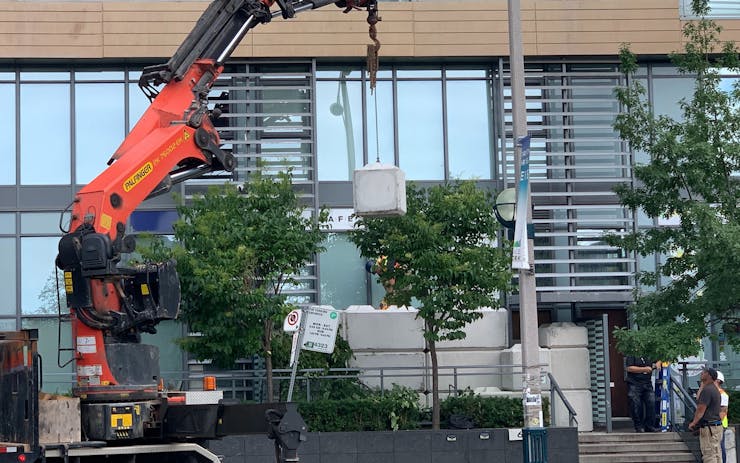In the dead of winter, it may be hard for Torontonians to recall the stifling events of last summer.
But for many, the words “concrete blocks” will immediately call to mind the memory of Toronto bylaw officers and police raiding unlicensed dispensaries who persistently reopened until authorities blocked their entrances with massive cement slabs.
(In several cases, dispensaries and their supporters rented heavy machinery to remove the blocks and reopen for business, though they were then shut down once more.)
This week, news emerged that the process of blocking dispensaries with 4,000-pound concrete slabs cost more than $360,000.
In all, the cost to wage that battle was $361,459.49, according to Toronto senior communications advisor Alex Burke. Beyond the cost of the blocks themselves and the equipment from the department of Municipal Licensing and Standards to put them into place, they required hours of labour from MLS workers, input from structural engineers, and security on site as the blocks were installed, removed by scofflaws, installed again, and so forth.
Rather than paying for all of this out of municipal funds, Burke told the Toronto Star, “The city has received monies from the provincial government to support the establishment and implementation of an enforcement strategy for cannabis in the city of Toronto.”
Beginning with the first concrete slab installation in June (reversed by three men and a backhoe shortly thereafter), the battle of the concrete slabs between Toronto authorities and dispensaries stretched all of last summer and on into September.
Because illicit retailers had been renting rooms to tenants, in order to exploit a loophole preventing raids on dispensaries that were also residences, the raids were sometimes tense: during one, an angry man who said he was just a tenant getting cheap rent above a dispensary attempted to push his way through police.
At another, authorities cement-blocked a building in which there was a man asleep in an upstairs bedroom. They claimed he had broken in during or after the raid, but firefighters removed the blocks nonetheless.
By midsummer, the cement blocks had their own twitter account—though the blocks didn’t stop unlicensed trade, since scofflaw dispensary chain CAFE simply took to selling their wares on the sidewalk in front of the blocks.
Lawyer Caryma Sa’d concluded, “If the goal was to drum up respect for rule of law by striking fear into the hearts of citizens, that plan flopped. Public opinion was largely supportive of CAFE and its customers, particularly since the province had already screwed up brick and mortar cannabis retail.”
If the goal was to drum up respect for rule of law by striking fear into the hearts of citizens, that plan flopped. Public opinion was largely supportive of CAFE and its customers, particularly since the province had *already* screwed up brick and mortar cannabis retail. pic.twitter.com/cJ09pJfX5U
— Caryma Sa'd – Lawyer (@CarymaRules) January 22, 2020
Eight months on from the first cement-block installation, multiple once-blocked dispensaries continue to operate in Toronto.
Watch Leafly TV
Click here to discover more videos on Leafly TV.





